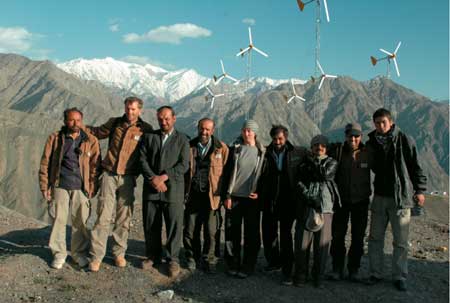| In what could never be described as a typical export scenario, Tony Woods is applying his renewable energy expertise in some of the world’s most dangerous environments. Now he’s powering up Afghanistan from Timaru. Timaru is a world away from Afghanistan, but for Sustainable Energy Services Afghanistan (SESA) director Tony Woods, it is where he has helped develop that country’s largest wind and solar power systems. In Afghanistan, security risks posed by the militant Taliban and the challenges of language, culture and the country’s fragmented village structure are the norm rather than the exception. Little wonder Woods, has, as he says, learned to keep his “eye on the objectives while dealing with the bumps on the road”. Woods, a former Massey University graduate in production technology, started his developmental consultancy business during the mid 1990s. He delivers renewable energy systems into countries such as Iraq, Bhutan, Vietnam, Pakistan and Afghanistan. His services include coordinating and procuring finance and, when competitively possible, accessing New Zealand technology and training. The initial impetus for his offshore work came while on holiday at a North Pakistan village where Woods noticed a turbine generating electricity at less than ten percent efficiency. On his return to Wellington, he successfully applied to the Ministry of Foreign Affairs and Trade for funding to support a project designed to improve turbine efficiency in North Pakistan. Much of the work is now carried out in Afghanistan under the umbrella of Sustainable Energy Services Afghanistan (SESA), a company registered in Kabul. SESA survives by competitively bidding for renewable energy construction work from development agencies such as the German and Japanese government, and more recently an economic development taskforce group within the Pentagon and United States Aid. In 2005, Woods’ family moved to Timaru, where he directs his business activities using Skype and telephone video conferencing to help break down boundaries, as well as regular overseas travel. The market share for a related New Zealand renewable energy company, Smart Energy, is small because virtually most New Zealanders have access to electricity via the national grid. In contrast only ten percent of Afghanistan’s population have access to electricity. New Zealand lacks a political driver to encourage domestic scale renewable energy sources as we are already a world leader, he says. About 70 percent of our national grid is based on renewable energy, compared to between 15 and 20 percent for countries with a heavy reliance on coal and oil reserves like Australia and some European countries. “Our government doesn’t have the same motive to reduce our carbon emissions through our power grid. The way they see it, we are already pulling our weight on the national grid. And its true, compared to many countries overseas New Zealand’s national power grid is highly renewable energy based,” he says. “However, one could equally argue that a ton of carbon is a ton of carbon and whether we are at 15 or 70 percent we are still putting carbon into the atmosphere. The environmental driver is still the same but politically it is not the same.” Woods considered it was the rate of change in power prices that was of concern to most New Zealanders as opposed to the absolute cost, especially when compared to the international market. In some Pacific Islands power could be up to five times more expensive and in some places in Afghanistan, double or triple in price. “If you go to a combat outpost it could be ten or 20 or 50 times higher. If you talk to a marine in Helmand (a province in Afghanistan) it’s so high. It’s then that you can compete.” In comparison to a charitable organisation, SESA’s business model is innovative and helps ensure their projects stay efficient and sustainable for local economies, he says. “It means we are hungry and looking for ways to do better. We also become a permanent part of the local economy. We don’t leave, so the projects stay supported.” |
The company introduced prepaid meters into Afghanistan three years ago. Despite the country’s poverty, the prepaid system ensures it remains financially sustainable over time, and, in terms of costs, a centralised electricity system is less expensive than the present means of energy |

